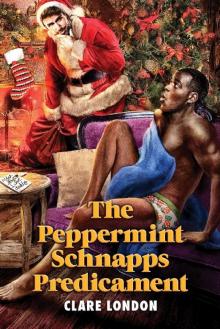- Home
- Clare London
A Good Neighbour
A Good Neighbour Read online
A Good Neighbour
By Clare London
A London Lads Story
A secret affair can’t go on forever.
Dylan Philips admits it himself: he’s a relentlessly single man in a small suburban town, both proud of and resigned to being a good teacher and a devoted nephew to his mischievous great-aunts.
When the aunts take a hand in matchmaking him with Josie Whitman, the girl who lives along the street, Dylan doesn’t tell them what kind of soul mate he’s really looking for—and the fact that he’s already found the man in question. It’s not Josie who’s travelling from London every month to her town property, but her journalist brother Neal. And Dylan meets up with Neal whenever he can.
But decisions must be made for their future. Dylan is risk-averse to everything from overseas travel to coming out, whereas Neal embraces adventure—and now he wants to take Dylan with him.
Horrified that his chance at love will move even further out of his reach, Dylan realises it’s time for him to own up to what kind of man he really is. He needs to find courage and compromise. And who knows whether the great-aunts will be a help or a hindrance with that?
Table of Contents
Blurb
Chapter 1
Chapter 2
Chapter 3
Chapter 4
Chapter 5
Exclusive Excerpt
More from Clare London
About the Author
By Clare London
Visit Dreamspinner Press
Copyright
Chapter 1
I LOVED my two great-aunts dearly—I always had. But they’d been on at me for years to settle down. To find my true love—to marry, and all that romantic jazz.
Problem was, in their mischievous and slightly rheumy eyes, it involved a girl.
“You’ve been friends for ages with that sweet girl Josie Whitman. Wouldn’t that make a very neat arrangement, Dylan? She’s a close neighbour already.” Aunt Bess’s shortsighted eyes screwed even smaller with the effort of focusing on me. She was small and plump, perched precariously on the edge of my sofa cushion, and her outrageously bright yellow nylon cardigan kept sliding off her shoulders. She yanked it back up absentmindedly and smiled at me, the expression of girlish mischief at war with her grandmaternal looks.
“She’s a fine-looking young lady,” Aunt Mitzi agreed in her high little voice, her slim and nervy body fluttering like an exotic bird dressed in jersey and denim, trapped in the comfortable folds of my capacious old armchair. Her elegant hands shook continuously with the onset of Parkinson’s, and today her sparse hair was dyed a rather indigestible auburn. “I said so, when they first moved in, didn’t I, Bess? Josie and her brother, both of them with those dark, strong features.” She peered at me too. “She’d look a real treat standing beside you, Dylan. Something to offset that sickly pale look of yours. Someone to share all this leisure time you have when the dear little children go home every day.”
I rolled my eyes, but just out of her sight. “I’m fine, thank you. Not sickly at all. And it’s not leisure time, as you well know. My students are not little children, they’re young adults at college, and I have plenty of their course work to do outside of class time. And when I am free, I have my own friends.”
“Friends are all very well, Dylan. But that’s never the same as a soulmate.”
Did they really think I didn’t wish for that as well? Nearly thirty years young was how I described myself, a reluctantly single science teacher living in a small, quiet suburb on the outskirts of London. Petersham was close to Richmond Park and less than ten miles from central London, but some days it might as well have been on the moon. The residents liked to call it a village—I called it a time warp. Don’t get me wrong, we had the benefit of London’s public transport and a wide variety of neighbours. But we also had the minimum of eating places—most definitely no McDonald’s yet—and we still played cricket on the green in the summer. Life there was cosy and fun most of the time, and luckily it had access to several good colleges so I’d found a good, secure teaching job. But I knew from my early teens that if I wanted adventure, I wasn’t likely to find it at home.
And of course people loved to gossip in that kind of setting. That is, gossip about me and my lack of a girlfriend. At least, my great-aunts did.
Bess sniffed in my direction. “I’m not so sure about that sometime brother of Josie’s.”
I hid my smile. “His name is Neal. And sometime brother? What does that mean?”
Mitzi grimaced. She didn’t always agree with Bess, but when she chose to, they became an immutable force. “Dylan, you’ve been a restrained, responsible boy all your life. I don’t expect you to understand the eccentric ways of these artistic types.”
Good God. She made him sound like he walked naked through the streets at whim, with Lady Caroline Lamb on a leash behind him. Probably ate babies’ heads on toast for breakfast too. “Mitzi, he’s a journalist. A writer. That’s his job.”
Mitzi sniffed in concert with Bess and shook her head. An auburn curl worked loose and fell over her forehead. “Coming and going at whim,” she pronounced. “Arriving and leaving at all hours, with no decent sense of routine that I can see. Some kind of gypsy, I’d call him. Hardly ever visits the local shops, never has time for neighbourly business, like Josie does. She’s always been very hospitable, using local tradesmen, sending donations to the school fair, offering recipes to the minister’s kitchen. She must have her hands full, keeping a casual good-for-nothing like him in check.”
“He travels a lot,” I said, rather shortly. “Else I’m sure he’d do his share.” Since when was keeping unusual hours a sign of dissolution?
“Maybe that’s why you go around there so often,” Bess murmured.
I was suddenly on alert. “I’m sorry?”
Bess looked straight at me, eyes wide and apparently guileless. “To help Josie with household repairs. Isn’t that what you told us last time? I’m sure she appreciates your help. As you say, her brother travels a lot….”
I didn’t mistake the verbal air quotes around those last words, did I? I wondered if I’d given myself away. Bess was far sharper than most people gave her credit for.
“Poor Whitman orphans.” Mitzi sighed theatrically.
“Well, I know how that is,” I said wryly.
Bess had the grace to look chastened. My parents were both sadly gone by now. “But you’re so much more mature about it, Dylan. You’re such a steady young man.”
I bit back a rueful sigh of my own. I’d found there wasn’t much else to do when Bess cranked up her bossiness. “I’m just being neighbourly too. I helped them get settled when they moved in, and we became friends. That’s why I go around there. Occasionally.”
“You have a key, Dylan.”
I cleared my throat. “When they’re both away, I collect the post, check the pipes aren’t leaking. That kind of thing.”
“She keeps a really tidy house.” Mitzi admired her shoes, which were new from our recent trip out to the sales. Her attention was drifting away. “She’s always been most hospitable. Did I say that before?”
“You did.” I smiled with fondness at her.
Mitzi fluttered her eyelashes like she was fifty years younger all over again and I was one of the many, many boyfriends who’d apparently called at her house when she was Mum’s age and twice as flighty. “Josie invited me in for tea only the other day.” I knew that’d mean at least six months ago, because Josie hadn’t been around much this season. “Showed me all the pictures of her poor, dead parents. Her school photos. Some of that brother of hers.” She straightened a miniscule crease in the fabric at her wrist. “I must confess I can see the attraction.”
/> I stared at her, startled. Bess looked studiously at her lap.
A slight blush appeared on Mitzi’s cheeks but her eyes were innocently steady. “Her father, I’m talking about. So very handsome, in the family portraits. It’s easy to see where Josie got those pretty, dark looks. What did you think I meant, Dylan? It’s really not polite to sit slack-jawed like that.”
“I suppose the son has the looks too.” Bess’s eyes were on me now.
Mitzi’s nose crinkled. “But he’s a boy, Bess. Who’s bothered with what boys look like?”
“Not us, of course,” Bess agreed. They glanced quickly at each other and—no other word for it—smirked.
I opened my mouth to offer my opinion, then closed it again. The room felt unseasonably warm. I wondered when, if ever, I’d learn to spot if they were up to something.
With one of the amazing non sequiturs Mitzi was infamous for, she swivelled around to stare at me again. “Did you taste that cinnamon apple pie of Josie’s, Dylan? Never too much spice, and her short crust pastry’s as light as filo.”
“A cook that good should be on The Great British Bake Off.” Bess nodded in agreement with Mitzi.
“I had just the tiniest of slices that day, but it was delicious. You could do well for yourself using some of her recipes, boy.” Both aunts often called me “boy,” conveniently forgetting I was old enough to have boys of my own if I’d chosen. Perhaps it helped them maintain the illusion they were still young ladies themselves.
I got up from my other armchair to collect the pot of strong English tea, to refill their cups. The great-aunts came to visit me once a week, every week, in all weathers. I fetched them from Laurel House, a sheltered community on the other side of the park, and guided them into my house like the precious cargo they were. I listened to their lively, often argumentative chat and fed them tea and plenty of cakes. They’d loved me as a child, and Mum too. For a while, after my father’s death, we’d all shared this big, old-fashioned house. When Mum died a few years after that, the aunts stayed on and were my guardians for my last few years of childhood. Then they’d insisted on moving to Laurel House and built a wide group of new friends that put me, the free spirit, to shame.
So now, when I was adult and it was my inherited home, it seemed natural for me—and a pleasure—to look after them in return. No one ever told me how or why the great-aunts had originally come to live in the same house as us, nor was my knowledge of our true relationship as clear as it should have been. They were definitely not sisters, and I sometimes doubted they were even Mum’s blood relatives. But like I said, we lived in a village, and if you were settled there like I was, you took whatever package you were dealt—which, for me, included Aunts Bess and Mitzi. Like any good double act, they made me smile with their wicked wit and dubious reminiscences. And yes… even their shameless attempts at matchmaking.
It was a good bargain, in my eyes.
“I’ll have just the tiniest slice of the chocolate.” Mitzi’s eyes flickered over the cake stand. It would be her third.
“Maybe not as good as Josie’s,” I murmured. “But I’m glad you like it.”
Bess snorted quietly and Mitzi just shook her head. They both shifted on their seats, getting settled for the replenished refreshments. I smiled, appreciating the fact that despite their casual chatter, they always treated our visits like a proper occasion. Their hair was always fiercely styled and coloured, and they doused themselves in a mist of perfume that wafted up my nose. And their clothes? Both of them were well past the socially acceptable age for wearing sweatshirts with “Just Do It” on the front, in Mitzi’s case, and cropped capri pants in Bess’s, but neither one of them seemed to care. For them, it was always their favourite outfit of the day.
“Anyway, Josie doesn’t really stay there anymore,” I said, cutting and serving the cake for them both. “You remember, don’t you?” I dropped four sugars into Mitzi’s cup and stirred it carefully for her. “She’s moved on. She works for that fashion magazine and has a successful career in London, and she stays at a friend’s flat during the week. Maybe I didn’t tell you.”
Of course I had, and many times at that. Josie Whitman had moved into the house down our street with only half an idea of home—the other half was fixed firmly on property investment. She was a glamorous, friendly woman with plenty of personal charm, but her career meant far more to her than a reputation for fine cake-making. She came back and forth to the house in the early months, dressed in suits as sharp as her wit and intelligence, and full of plans for remodelling it. And her generosity towards the village was only restricted by the time she had to spare. But as the house became more presentable, her visits became rare. Nowadays, I’d heard she went by the more professionally sober name of Joan and was a potential management star for Vogue.
I didn’t think any of this was a secret for anyone who wanted to ask. They were by no means senile, the aunts, but they most definitely had selective hearing.
Aunt Bess rattled her teacup. When I looked over, her beady right eye winked at me. She’d never accepted the need for spectacles, yet I’d never seen her miss a step or find it difficult to read her book. She tilted her head, and I noticed absentmindedly that she had earrings on that didn’t match. Both of them were pearl drops, but one was set in elegant, filigree gold, whereas the other was set in yellow plastic and looked like it had come out of a Christmas cracker.
I smiled, knowing her cup code from years of practice. I reached discreetly for the small half bottle of whiskey on the side table and measured some into her tea. She tapped a fingernail on the side of the cup—I raised an eyebrow and measured out more.
“And Josie has a nice young man already,” I added. “She brought him over at Christmas.” I resisted the urge to repeat, “You remember?” He was smart and sharp too, something in real estate. Their corporate city image oozed money and success, but there’d been genuine affection between them as well. “She visits now and then to keep an eye on the house for her and Neal, and sometimes her fiancé comes with her. That’s all. She’s not looking to settle back here with a local teacher like me.” There was no regret in my voice—there’d never been anything but friendship between us. I wished her all the best with her professional life and partner.
Mitzi shrugged. She took no notice of my protest. “She’s just spreading her wings for a while. Pretty, cute girl like her.”
“The fiancé’s pretty cute too,” I murmured. Should have resisted that urge, of course, but Mitzi didn’t notice. Maybe Bess did, glancing quickly over at me with narrowed eyes.
“So, Dylan.” Now Bess moved awkwardly on her chair, her blue-check trousers maybe a little too tight, not that I’d dare make any comment. Besides, she always settled herself like this prior to making one of her announcements. “I assume you’ll be calling on her this afternoon?”
Mitzi nodded at me, her eyes suddenly sparkling. “We don’t mind you taking the time out—we all know what young boys are like. You need a life of your own. Leave us here, by all means, while you make a social call. You’ve always had lovely manners. Anyway,” she continued, her mouth settling into a pout, “Bess needs her nap this time of day.”
Bess snorted again.
“I won’t be calling on anyone,” I said, laughing. “I’m spending the rest of the afternoon with you two ladies.”
With an affected wave of the wrist, Mitzi gestured at me and coughed. “You went around there last month.”
“And the month before,” Bess added.
I busied myself with the cake plates, stacking and restacking all three of them on the tray until my heartbeat settled again. “Like I said, just to be neighbourly. And that was after I took you two home, surely?”
Out of the corner of my eye, I saw Mitzi shrug. She and Bess exchanged a quick look. “We still think you should go, Dylan.”
“Look, I don’t think Josie’s there today.” I felt I’d strayed into an alternate universe, but then, tea with the aunts was oft
en like this. “She doesn’t come over every month. I have told you before.” Last week, a case in point. And the week before. Damned if I knew why I kept trying, sometimes.
“Nonsense. Someone’s taken in the mail already today,” Mitzi said, her tone a little sly. “And the dead leaves on the front step have been brushed away.”
I stared at her, my breath suddenly tight in my throat. “How the hell do you know that?”
Her eyes widened, though mischief flickered in the pupils. “Good heavens, Dylan, I’m very concerned at your language. Do they teach that at your college?”
I bit back a sigh. “I’m sorry, Mitzi, you startled me. But what do you think that high hedge around their house is for, except for privacy?”
“Pshaw. If you bring yourself to this town, you bring your business with you. That’s been the way since your mother’s time and long before then too. Am I right, Bess?”
Bess nodded. She crossed her arms and rested them on her ample breasts. Her cardigan had slipped off a shoulder yet again. “The house looks very welcoming too. There’s a new coat of paint on the downstairs window frames, and the lawn’s been cut this month. That’s the loving touch for you. I brought you some flowers to take, Dylan. You can pick them up from the table in the lobby.”
“Flowers?” I stared at her, astonished. It was a family joke that Aunt Bess always carried a ludicrously large handbag with her wherever she went. But I’d never had the nerve or appetite to look inside to see what it hid.
“You’re a young man, like Mitzi says. You should always take them when you’re courting. You shouldn’t need the advice of old women like us.”
“I told you, I’m not courting Josi—”
“But seems like you still do,” Mitzi interrupted. “Need advice, that is.” She gave an exaggerated sigh and shook her head. A miniscule—but real—diamond pendant around her throat glinted as it caught the light, at odds with her modern, casual clothing. “Change that shirt of yours for something better pressed, boy, and then run along. Such bad form to keep a lover waiting.”

 Timeslip
Timeslip Just Like in the Movies
Just Like in the Movies The Accidental Baker
The Accidental Baker Santa, Actually
Santa, Actually Branded
Branded Romancing the Rough Diamond
Romancing the Rough Diamond Unwrapping
Unwrapping Zest: an accidental baker story (The Accidental Baker Book 2)
Zest: an accidental baker story (The Accidental Baker Book 2) Romancing the Undercover Millionaire
Romancing the Undercover Millionaire Chase the Ace
Chase the Ace Peepshow
Peepshow Between a Rock and a Hard Place
Between a Rock and a Hard Place Making Camp
Making Camp The Peppermint Schnapps Predicament
The Peppermint Schnapps Predicament Romancing the Ugly Duckling
Romancing the Ugly Duckling His Gift
His Gift True Colors
True Colors One Night Stand
One Night Stand Romancing the Wrong Twin
Romancing the Wrong Twin A Good Neighbour
A Good Neighbour Ambush
Ambush Sweet Summer Sweat
Sweet Summer Sweat